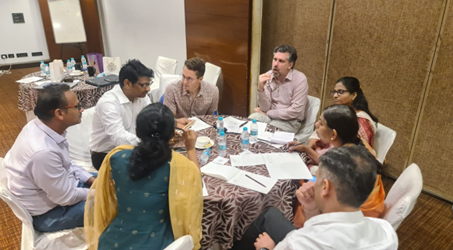Congratulations to the following PREDICT authors:
Long E, Borland ML, George S, Jani S, Tan E, Neutze J, Phillips N, Kochar A, Craig S, Lithgow A, Rao A, Dalziel S, Oakley E, Hearps S, Singh S, Gelbart B, McNab S, Balamuth F, Weiss S, Kuppermann N, Williams A, Babl FE; Paediatric Research In Emergency Departments International Collaborative (PREDICT); Children’s Inpatient Research Collaborative of Australia and New Zealand (CIRCAN). Sepsis epidemiology in Australian and New Zealand children (SENTINEL): protocol for a multicountry prospective observational study. BMJ Open. 2024 Jan 12;14(1):e077471. doi: 10.1136/bmjopen-2023-077471. PMID: 38216206.
Robertson T, Borland ML, O’Brien S, Haskell L, Babl FE, Dalziel SR, Tavender E. Understanding the uptake and adaption of targeted implementation interventions for reducing bronchiolitis investigations and therapies. Acta Paediatr. 2024 Jan 8. doi: 10.1111/apa.17090. Epub ahead of print. PMID: 38189212.
Craig S, Collings M, Gray C, Benito J, Velasco R, Lyttle MD, Roland D, Schuh S, Shihabuddin B, Kwok M, Mahajan P, Johnson M, Zorc J, Khanna K, Fernandes R, Yock-Corrales A, Santhanam I, Cheema B, Ong GY, Jaiganesh T, Powell C, Nixon G, Dalziel S, Babl FE, Graudins A. Analysis of guideline recommendations for treatment of asthma exacerbations in children: a Pediatric Emergency Research Networks (PERN) study. Arch Dis Child. 2024 Feb 7:archdischild-2023-326739. doi: 10.1136/archdischild-2023-326739. Epub ahead of print. PMID: 38325912.
Sasse R, Borland ML, George S, Jani S, Tan E, Neutze J, Phillips N, Kochar A, Craig S, Lithgow A, Rao A, Dalziel SR, Williams A, Babl FE, Went G, Long E; Paediatric Research in Emergency Departments International Collaborative (PREDICT) Network. Appraisal of Australian and New Zealand paediatric sepsis guidelines. Emerg Med Australas. 2024 Feb 25. doi: 10.1111/1742-6723.14381. Epub ahead of print. PMID: 38403429.




